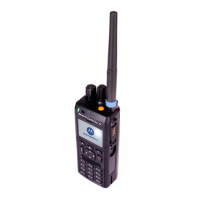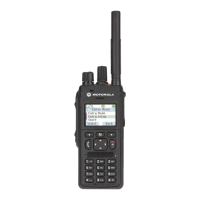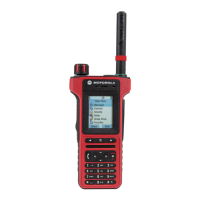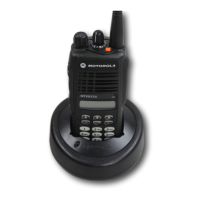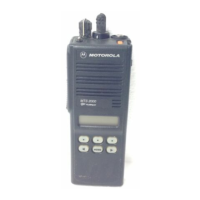Do you have a question about the Motorola MTP3200 and is the answer not in the manual?
Provides essential safety guidelines for radio usage and RF exposure compliance.
Outlines copyright information and usage restrictions for Motorola's software and documentation.
Explains the meaning of various icons used in the manual to convey information and warnings.
Explains how to use the guide and highlights special notations for important information.
Details technical specifications such as voltage, current, RF power, and operating temperature.
Step-by-step instructions for correctly attaching the antenna to the radio.
Procedure for removing and installing the radio's battery pack correctly.
Instructions on how to lift out and replace the existing battery with a new one.
Guides the user through the process of inserting a SIM card into the radio.
Explains the prerequisites and process for charging the radio's battery.
Details the procedure for charging the radio using a USB cable and driver.
Explains the battery icons and LED indicators used during the charging process.
Describes the two available modes for charging the radio (ON or OFF).
Alerts the user about low battery levels with audible and visual cues.
Identifies and describes the physical controls and indicators on the radio.
Presents the radio's home screen elements and display areas.
Explains the various icons displayed on the radio indicating status and features.
Step-by-step guide to turning the radio on and its initial registration process.
Instructions on how to unlock the radio if it is locked at power up.
Procedure to unblock the radio using the PUK code after incorrect PIN entries.
Explains how to lock and unlock the radio's keypad and buttons.
Provides guidance on how to hold the radio for optimal microphone use.
Describes how to flip the display orientation for easier viewing when wearing the radio.
Instructions on how to switch between Trunked Mode Operation and Direct Mode Operation.
Explains how to activate Transmit Inhibit Mode for RF sensitive areas.
Details methods for selecting a talkgroup for communication.
Guides on how to activate talkgroup scanning to monitor calls.
Instructions for dialing numbers using the radio's soft numeric keypad.
Explains how to enter text using the radio's interface.
Describes icons used on the text entry screen to indicate modes and character counts.
Details the usage of various keys for text entry and message sending.
Explains the functionality of Broadcast Calls for high-priority communication.
Describes the feature allowing a dispatcher to listen to the radio's environment.
Lists features that can be assigned to One-Touch buttons for quick access.
Explains the feature to temporarily disable the radio if it's stolen.
Describes the permanent disabling of the radio if it's stolen or lost.
Details how to switch audio output between the speaker and earpiece.
Instructions for using the radio with high audio output via the main speaker.
Instructions for using the radio with low audio output via the earpiece.
Explains the soft key functions available during an active call.
Guides on how to select and use different network modes like Trunked, Direct, or TXI.
Explains Trunked Mode Operation, which uses infrastructure for communication.
Steps to enter Trunked Mode Operation (TMO) on the radio.
Methods for selecting a talkgroup within TMO mode for communication.
Procedure to initiate a group call in Trunked Mode.
How to receive a group call when the radio is in idle mode.
How the radio handles receiving a higher priority group call during an active call.
Explains how DGNA allows dynamic allocation and updating of talkgroups.
How the radio receives and processes DGNA messages.
How DGNA Auto Select automatically switches to the added talkgroup.
Steps to view details of DGNA talkgroups and attach to them.
How to make calls to landline or cellular numbers and office extensions.
How to make point-to-point or individual calls that are not heard by others.
Explains Local Site Trunking (Fallback Mode) for communication without network infrastructure.
Details what happens when the radio enters Local Site Trunking mode.
Describes the process and indicators when the radio exits Local Site Trunking mode.
Explains Direct Mode Operation for simplex communication outside infrastructure control.
Steps to enter Direct Mode Operation (DMO) on the radio.
Methods for selecting a talkgroup within DMO mode.
Procedure to initiate a group call in Direct Mode.
How to receive a group call when the radio is in idle mode in DMO.
How to make point-to-point calls in DMO mode.
How radios communicate via a repeater in DMO mode to extend range.
How Gateway Mode enables communication between DMO radios and the TETRA network.
Options for group calls in DMO mode using Gateway or Repeater.
Explains Transmit Inhibit Mode, which stops radio transmissions for safety.
Details the Emergency Mode for high-priority communication.
How to initiate and receive emergency calls in TMO and DMO modes.
Describes Silent Emergency Mode for discreet emergency alerts.
How to initiate and receive emergency group calls.
How to make emergency private calls with priority.
How to make emergency telephone calls using MS-ISDN.
Explains how the radio sends an emergency alarm to the infrastructure.
Describes the Hot Microphone feature for hands-free emergency transmissions.
Explains the alternating hot microphone feature for continuous emergency transmission.
Steps to enter the radio into Emergency Mode.
Procedure to exit the radio from Emergency Mode.
How to make an emergency group call when in Emergency Mode.
How to receive an emergency group call.
Tips and guidelines to improve the accuracy and success rate of GPS location fixes.
Steps to enable the GPS feature on the radio.
Explains the GPS icon displayed on the screen when location data is received.
Details various coordinate formats (Lat/Lon, UK, Irish) and their display elements.
How to view the radio's current or last calculated geographical position.
Options to adjust GPS accuracy between Medium and High settings.
Important considerations and limitations for using the GPS feature.
Instructions on navigating through the radio's main menu options.
Explains the icons used within the menu for quick identification of items.
Outlines the hierarchical structure of the radio's main menu options.
Information on sending and receiving text messages, including character limits.
How to create and send new text messages.
Steps to send a message to an individual contact or phone number.
Steps to send a message to a specific group.
How to send messages that are stored and forwarded later.
Details on accessing and managing incoming messages stored in the inbox.
Procedure to access the message inbox.
How the radio indicates and allows access to newly received messages.
Options available when viewing messages in the inbox or outbox.
Feature to call numbers directly from messages.
How to save numbers found within messages to contacts.
How to initiate a call to a number found within a message.
How to start a group call with the message originator's talkgroup.
Describes how immediate messages are received and displayed.
Information on accessing messages that have been sent.
How to use and manage predefined and user-defined message templates.
Steps to send a custom message template.
How to create, edit, view, and delete user-defined message templates.
Information about using and sending pre-programmed message templates.
Steps to view the available predefined message templates.
How to send predefined message templates.
How to send status messages to groups or specific numbers.
Steps to view available status messages.
How to send a status message to a selected group.
Feature to send status messages to private numbers or selected talkgroups.
Steps to send a status message to a specific recipient.
How to store, manage, and view contact information on the radio.
Step-by-step guide to adding new contacts to the radio's list.
How to modify existing contact details.
Procedure to remove a specific number from a contact entry.
How to remove an entire contact entry from the list.
How to check the storage capacity for contacts, private numbers, and phone numbers.
How to initiate calls by selecting contacts from the stored list.
Options for securing the radio against unauthorized use.
How to enable PIN code authentication for radio security.
Steps to set up a PIN code for the radio.
Procedure to unblock the radio using a PUK code.
How to change the existing PIN code for security.
Settings for locking and unlocking the radio's keypad to prevent accidental presses.
Configuration options for notifications when the keypad is locked.
How to set an automatic delay for the keypad lock feature.
How to configure the keypad to be locked automatically when the radio starts up.
Viewing the status of air encryption for secure communication.
How to check if air encryption is currently enabled or disabled.
Procedure to delete air interface encryption keys from the radio.
Verifying the validity of the K key used for infrastructure authentication.
Steps to check if the K key is valid for authentication.
Verifying the TMSCK for encrypted calls and data in TMO Mode.
Steps to check if TMSCK is valid for encrypted TMO operations.
Verifying DMSCK for service confidentiality in DMO Mode.
Steps to check if DMSCK is valid for encrypted DMO operations.
Enhancing security for direct mode communication using SCK.
How to change the DMO SCK key version.
Activating Covert Mode to disable all alerts and notifications for stealth.
Steps to activate or deactivate Covert Mode on the radio.
Allows customization of various radio configurations.
How to set the incoming call ring style for duplex and simplex calls.
Steps to select and set the ring style for different call types.
How to adjust speaker and earpiece tone volumes.
Detailed steps to set various volume levels like voice, keypad, and tones.
How to change the radio's display language.
Steps to select and set the desired language for the radio interface.
How to configure the radio for transmitting and receiving data.
Options to set the radio for Voice Only, Data Only, or Voice & Data modes.
How to adjust various radio audio settings.
How to select and customize audio profiles for different environments.
Steps to select a desired audio profile.
Feature to eliminate howling effects during audio playback.
Steps to activate or deactivate howling suppression.
How to control audio routing between speaker and earpiece.
Steps to select audio routing preferences (Always Loud or Spkr Cntrl).
How to set volume adjustments to Individual or Common modes.
Steps to choose between Individual and Common volume adjustment modes.
How to activate or deactivate various radio tones.
How to activate or deactivate keypad tones for button presses.
Steps to turn keypad tones on or off.
How to activate or deactivate all audio tones on the radio.
Steps to turn all audio tones on or off.
How to set a tone when the talk permit is granted.
Steps to enable or disable the talk permit tone.
How to activate/deactivate a tone indicating data transmission readiness.
Steps to enable or disable the clear-to-send tone.
How to activate/deactivate periodic alerts for missed calls or low battery.
Steps to configure periodic alert tones and their intervals.
Settings for Double Push-To-Talk (D-PTT) feature tones.
Steps to configure D-PTT mode and tone style.
How to adjust various radio display settings.
How to flip the display orientation for easier viewing.
How to adjust the font size for better readability.
How to activate or customize the screen saver feature.
How to manage the screen backlight to save battery power.
How to adjust the screen brightness for visibility.
How to change the idle screen wallpaper.
How to set the display to turn off automatically after a period of inactivity.
How to control and set the radio's displayed time and date.
How to configure the display to show time and date, or only one of them.
How to set the time format to 12-Hour or 24-Hour.
How to manually set the radio's time if automatic update fails.
How to set the date format (e.g., DD/MM/YY).
How to manually set the radio's date if automatic update fails.
How to adjust the time offset for different time zones or daylight saving.
How to configure automatic updates for time and date from the infrastructure.
How to enable/disable Energy Economy mode to save battery life.
Steps to activate or deactivate the Energy Economy feature.
How to check if Energy Economy mode is supported by the system.
How to select transmission power levels (Class 3L or Class 4).
Steps to select higher RF power for areas requiring better signal strength.
Settings related to the functionality of the volume and talkgroup rotary knobs.
How to lock or unlock the rotary knobs.
How rotary knob behavior is set when the keypad is locked.
How to configure talkgroup list scrolling to loop or stop.
How to set the scroll range for talkgroups within a folder or across folders.
How to confirm talkgroup selection using the rotary knob.
How to assign functions to the rotary knob's function keys.
Settings for scanning and managing group lists.
How to activate/deactivate scanning, view and edit scan lists.
Steps to activate talkgroup scanning for monitoring calls.
How to edit talkgroups within the active scan list.
How to set up new scan lists.
How to rename, check capacity, clear, add, or edit scan lists.
How to manage favorite group lists and folders.
Steps to create a new folder for favorite groups.
How to add a talkgroup to a favorite folder.
How to rename or delete folders in the favorite list.
How to remove a specific talkgroup from a favorite folder.
How to view personal and radio information.
How to view and edit private numbers, phone numbers, and radio information.
How to view the history of dialed, received, and missed calls.
Steps to view lists of recent calls.
How to initiate calls directly from the recent calls list.
How to save numbers from recent calls into the contact list.
How to remove entries from the recent calls list.
How to switch between radio operation modes and networks.
How to select the desired network for operation.
How to register with a different network when out of range.
How to switch between Trunked Mode, Direct Mode, and TXI Mode.
Refers to GPS Location Service information.
How to view the radio's current or last known geographical position.
How to adjust GPS accuracy settings.
How to transfer data using the radio over a TETRA system.
How to view statistics for sent/received data and bandwidth.
How to check the encryption status of data sessions.
How to manage SIM card based End-to-End Encryption.
How to enable or disable End-to-End Encryption for the SIM card.
How to turn on/off the alarm tone for clear transmissions.
How to update old or incorrect encryption keys.
How to view Operational Tactical Address (OPTA) information.
How to define characters to be masked in OPTA names.
How to start the crypto registration process.
How to change audio output for encrypted group calls.
How to enable DMO encryption modes.
How to change encryption keys for SDS messages.
Adds ISDN number to the radio for addressing calls and messages.
Instructions for dialing numbers using the soft numeric keypad.
How to dial phone/PABX numbers using shortened codes.
Steps to use the phone/PABX speed dial feature.
How to make calls to landline telephones or office extensions.
Steps to initiate a phone or PABX call.
How to make individual, point-to-point calls.
Steps to initiate a private call.
Allows dialing full numbers by entering only a part of it.
Explains interactions between radios with and without SIM card encryption.
Recommendations for storing the radio and batteries properly.
Tips and procedures to maximize the service life of the radio's battery.
Information on the optimal temperature range for charging the battery.
General rules and best practices for charging the radio battery.
Important warnings and cautions related to battery handling and charging.
General advice on caring for the radio, including cleaning and avoiding extreme conditions.
| Brand | Motorola |
|---|---|
| Model | MTP3200 |
| Category | Portable Radio |
| Language | English |
